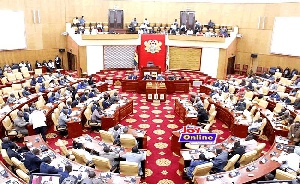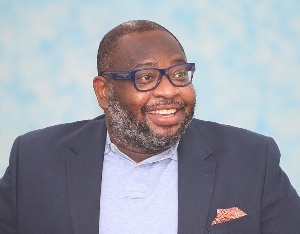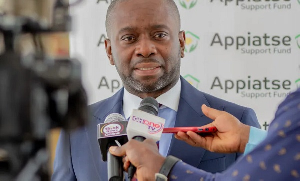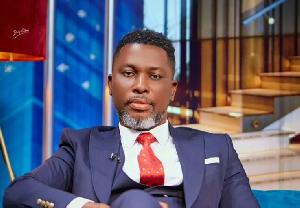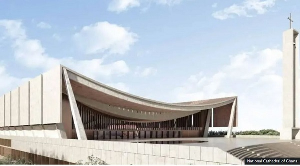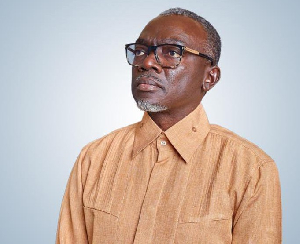Some Members of Parliament (MPs) who became victims of the latest edition of an evaluation poll conducted by the Political Science Department of the University of Ghana (UG) say the poll may jeopardize their chances of being re-elected into the legislature.
They have, therefore, ran to the Speaker, appealing to him to save them from public ridicule which some of them are already being subjected to.
For instance, they want the Rt. Hon. Speaker, Prof. Aaron Michael Oquaye, to set up a Special Committee to engage the researchers to set out the modalities for which a Member could be assessed.
First Deputy Speaker of Parliament, Joseph Osei Owusu, who led his colleague MPs to seek refuge in the Speaker expressed misgivings about the modalities and parameters on which the evaluation was done.
He told the House that judging from the commentary on radio about the report and the content in the report, it was obvious that Members of Parliament were evaluated by the Department of Political Science, University of Ghana, without considering their constitutional responsibilities.
Role of MPs
“Mr. Speaker, about a year ago, a matter like this came up and I asked Members of the Constitutional, Legal and Parliamentary Affairs to assist agencies that are interested in evaluating Members of Parliament by agreeing with them what is it that a Member of Parliament will be evaluated upon? But Mr. Speaker, this report and the subsequent discussions with them in the media lead me to think that it is time Members got involved in how they are evaluated. So, I am proposing that – fortunately for us, this body is from a reputable institution where Mr. Speaker you used to be a Professor, that we engage them, agree on what will be the parameters for evaluating Members of Parliament. When it comes to public discussions, Mr. Speaker, you can’t help it what people will say … sometimes it has nothing to do with the report itself. But when an agency or a body from the University of Ghana takes on an assignment like this, I think it is incumbent on us to assist them to be able to do it in a manner which will reflect the true role of a Member of Parliament”.
He added “In this circumstance, Mr. Speaker, I wish to recommend that the group that is involved in the research, be invited to meet with a group here to discuss with them what are the constitutional roles, what are the others and then agree on the modalities and parameters on which Members will be truly evaluated. Otherwise, if I spend all my time here as you do, and then I am evaluated from being absent from the constituency, where was I voted to work or the roads in my constitution have not been built therefore I am not performing? What is my role constitutionally? And I think Mr. Speaker, it is important that this matter is addressed once and for all. We cannot stop anybody from evaluating us. Indeed, it is in our own interest and it is in the public interest that our work is evaluated but we must agree on the parameters so that when a report is published we can speak on the report that truly reflects on the role of Members of Parliament under the constitution and in the society”.
The argument advanced by the First Deputy Speaker of Parliament was corroborated by the Minority Leader, Haruna Iddrisu.
Survival of MPs depends on UG’s polls
Quoting Order 191 of the Standing Orders of the House to buttress his argument, Mr. Iddrisu said the setting up of a Special Committee to engage the researchers is the best way to go to enable them (Researchers) to understand and appreciate the work that MPs do as mandated by the constitution.
According to him, as it stands now, the survival of MPs in the primaries and the 2020 polls much depends on the findings of the research that was conducted by the Political Science Department of the University of Ghana.
“Mr. Speaker, the survival and continuation of some of our colleagues if not all of us because the way we have been evaluated and the way judgment has been passed by the research group of the Political Science Department of the University of Ghana, we cannot interfere with their academic work but Mr. Speaker, they need to have a better understanding of who an MP is, what our responsibilities are relative to it”, he noted.
A survey conducted on the performance of all the 275 MPs by the University of Ghana has revealed that 180 of the incumbent MPs are likely to be voted out of office if elections were to be conducted today. That means, only 95 MPs are likely to retain their seats.
In all, a total of 27,500 Ghanaians in five randomly selected Electoral Areas in each of the 275 constituencies of Ghana participated in the study, the findings of which was unveiled on Monday, June 10, 2019, at the auditorium, School of Law, University of Ghana.
The study themed “Assessment of 275 Members of Parliament – Perspectives from the Constituents” focused mainly on performance of the legislators both at the constituency and on the floor of the House.
However, Mr. Iddrisu commenting further on the floor of the House, Tuesday, June 11, 2019, said they are alarmed by the findings of the report which seeks to suggest that 180 MPs are likely to be voted out in the 2020 elections.
“We are alarmed by this publication because we already have a very worrying attrition rate to which the Majority Leader has related to in this House. 180, then what will be left with the experienced hands in this House? Imagine the Chairman of the Finance Committee of Parliament (at this point, Dr. Mark Assibey-Yeboah retorted that he is already out provoking laughter among his colleague MPs), the Hon. Dr. Assibey-Yeboah and the role he plays in this House. How fair that he will be gone with the wind of a tiger wave of a Free Zone somewhere. So, Mr. Speaker, it is such an important matter that I want to invoke our Standing Orders, Order 191 which states that “The House may at any time by motion appoint Special or Ad Hoc Committee to investigate any matter of public importance; to consider any Bill that does not come under the jurisdiction of any of the Standing or Select Committee.
“This is an important matter and I do agree with the First Deputy Speaker that we need to work together with academia and with this research institution so that they better understand who we are, what we do, what our expectations are even though I admit that there is a role conflict and there is a confusion every other day as to the role of an MP but that confusion should not emanate from a University when ordinary members of the public will probably are uneducated or not better educated come to those assumptions and conclusions they can be forgiven but to come from academia is even more worrying and therefore I support the First Deputy Speaker that we get a Committee to engage them to appreciate the basis of the work that we have done, we will explain our part to enrich the work that we do”, he underscored.
Parliamentary body to assess work of MPs
The MP for Oforikrom, Dr. Emmanuel Marfo, on his part told the House that he was at the unveiling of the findings of the research and raised some very fundamental questions about the methodology used by the researchers.
He made reference to a statement he made on the subject in November 2017 calling for the setting up a body in Parliament that will assess the performance of MP. The Speaker, having heard him, referred the matter to the Constitutional, Legal and Parliamentary Affairs Committee to work on a framework that will help the House to assess the performance of MPs.
He said he finds it worrying that Parliament as an institution does not have an avenue to assess the performance of its Members. The absence of this body, he argued, has created a space for NGOs and academia and any other person interested in the performance of MPs to evaluate them.
“The public is actually looking forward to that kind of assessment and if we don’t develop our own framework and perhaps agree on a more rigorous scientific basis or methodology for doing so, then we will always come under this kind of attack”, he noted.
He nonetheless, said he agrees for the call to constitute a Committee to look into the matter and make some proposals for considerations by the House.
Speaker’s ruling
The Speaker, Rt. Hon. Prof. Aaron Michael Oquaye, having heard the disgruntled MPs, ruled that “these Honourable Members who have been in this House during this period, this term, have passed bills into law more than any other Parliament in the history of this country. It is a statistical fact verifiable and I put my honour on it. That is something worth remembering. And the bills were passed into laws by these very honourable MPs who are assiduously working in this direction among other things. Statements, questions admitted and responded to also are part of the excellent record of this particular crop of MPs – verifiable by any serious researcher and I put my honour upon it. These are matters that should be examined in such exercises in assessment. It is important for the public in these circumstances, to be well versed about the true nature and import of their representatives and I will implore researchers to please, ply this road and help the public rather, in understanding and assessing the work of MPs. No road no Vote is not part of the MPs work. Honourable Members of Parliament are not voted any sums of money to construct roads and that is serious talk about the functions of the Parliament as by our constitution and as by our practices. If anything at all, they can lobby, and they can plead but MPs don’t build roads. Common Funds has nothing to do with roads and if any person derives an MP because he or she has not built a road, then of course, it is unfair. I will advise researchers that there are certain misconceptions about the role of MPs. These are people who must help rather than contribute to the misperceptions and this is very important in our national development otherwise they will be promoting an attrition rate that will not be in the best interest of the country”.
He added “A Member of Parliament who is assessed without his work in committees cannot be said to have been properly assessed. Therefore, you need to know the person’s contributions at committees because the Committee is the workshop of Parliament – well established throughout the world. That is where we do the nitty gritty before we come to the plenary and we should all understand these and make them part of our assessment. I will not want anybody to say that MPs and the Speaker don’t want them to be assessed but assessment, 1, Methodology, 2, the areas for assessment – if you don’t get the subject areas for assessment right, then you cannot assess the person. In other words, what is he or she supposed to do and when you know what he or she is supposed to know, in perfect harmony with the rules of the game, then you can assess him. But you cannot assess him or her over something that is not even a constitutional duty of even that person. I will therefore invite that our doors are opened – all those who want to carry out such exercises, please it is not a matter that should be done in secrecy – it must be done openly and in fact, research demands that before results are published, you seek explanation, especially, where adverse reports are published. The person must have the opportunity and that is why the Auditor-General’s report is only a draft initially and when a person explains, then there is a final report. Therefore, as much as there is the need for some of these researchers … in fact research is important for nation development. But we must be very careful about some of these things. I do not want to be misunderstood in saying that I mean MPs should not be assessed. Some people will say are they not human beings; are they not also public officers?”
The Speaker speaking further on the issue, said the findings of the research is tantamount to inciting the public against the MPs and cautioned researchers to be mindful of such.
He therefore directed the Leadership and the House’s Committee to seriously contact the researchers to quickly make out areas for assessment for them, making them understand the true intent and purpose of the work of Parliament, noting that “we are ready to cooperate and in all these things, but the very areas of assessment must be clearly defined by the people. If a person is generous to dish out monies and it is upon that that you will say somebody else is not going back to Parliament, you are making a sad mistake because it is not part of the business of a Member to issue largesse. If we do that, well the attrition rate will continue to be too high; the quality will continue to come down then; and will not be in the interest of the nation. I think we all as a nation must be very careful about this development”.
General News of Tuesday, 11 June 2019
Source: kasapafmonline.com





